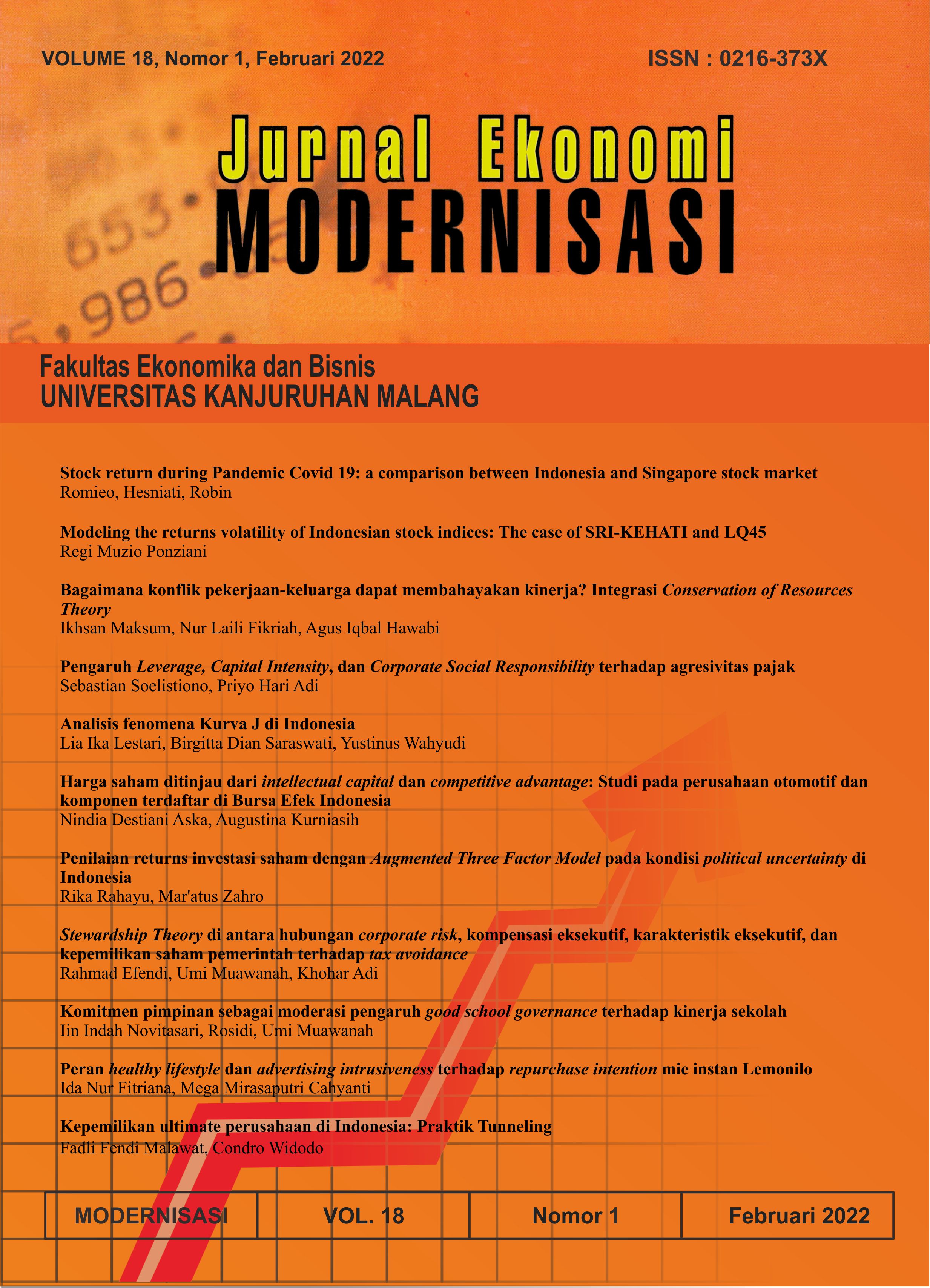Bagaimana konflik pekerjaan-keluarga dapat membahayakan kinerja? Integrasi Conservation of Resources Theory
Main Article Content
Abstract
The development of research related to work-family conflict is overgrowing. However, there are still various gaps involving the mediating role to investigate the indirect effect of work-family conflict on performance. This study aims to examine the mediating role of psychological well-being in the pathway of the effect of work-family conflict on performance. The researcher involved 81 respondents, most of whom were college employees. The basic theory in this study uses the conservation of resources theory. The study results found that psychological well-being could fully mediate the indirect effect of work-family conflict on employee performance. Based on the Conservation of Resources Theory, that workers who already have families are more likely to engage with conflicts between work and family. Logically, workers who cannot manage resources, they will channel resources only on one goal, namely at their work. Thus, their family environment lacks attention and ultimately the conflict between work and family will occur in a worker who cannot manage their resources.
Downloads
Article Details
Authors who submit a manuscript understand that if the manuscript is accepted for publication, the copyright of the article shall be assigned to Jurnal Ekonomi Modernisasi (JEM).
References
Baron, R. M., & Kenny, D. A. (1986). The moderator–mediator variable distinction in social psychological research: Conceptual, strategic, and statistical considerations. Journal of Personality and Social Psychology, 51(6), 1173.
Carlson, D. S., Kacmar, K. M., & Williams, L. J. (2000). Construction and initial validation of a multidimensional measure of work–family conflict. Journal of Vocational Behavior, 56(2), 249–276. https://doi.org/10.1006/jvbe.1999.1713
Cooper, D. R., Schindler, P. S., & Sun, J. (2006). Business research methods. Mcgraw-hill New York.
Dwijayanti, K. I., & Riana, I. G. (2018). The Effect of Work-Family Conflict on Job Satisfaction and Employee Performance. Journal of Multidisciplinary Academic, 2(1), 20–23.
Fitzpatrick, T., Janzen, B., Abonyi, S., & Kelly, I. (2012). Factors associated with perceived time pressure among employed mothers and fathers. Psychology, 3(02), 165. https://doi.org/10.4236/psych.2012.32025
Fotiadis, A., Abdulrahman, K., & Spyridou, A. (2019). The mediating roles of psychological autonomy, competence and relatedness on work-life balance and well-being. Frontiers in Psychology, 10, 1267. https://doi.org/10.3389/fpsyg.2019.01267
Frone, M. R., Russell, M., & Cooper, M. L. (1992). Antecedents and outcomes of work-family conflict: testing a model of the work-family interface. Journal of Applied Psychology, 77(1), 65–78. https://doi.org/10.1037/0021-9010.77.1.65
Geroda, M. K. B., & Puspitasari, E. (2017). The impact of work-family conflict toward job performance–the case of external auditor. The 3rd PIABC (Parahyangan International Accounting and Business Conference).
Goodarzi, H. T., & Hatami, S. (2015). The effect of work-family conflict and work-family facilitation on job satisfaction and job performance in national Iranian drilling (NIDC). Indian Journal of Fundamental and Applied Life Sciences, 5(2), 2821–2830.
Hair, J. F., Hult, G. T. M., Ringle, C., & Sarstedt, M. (2014). A Primer on Partial Least Squares Structural Equation Modeling (PLS-SEM). SAGE Publications, Inc.
Hobfoll, S. E., Halbesleben, J., Neveu, J.-P., & Westman, M. (2018). Conservation of resources in the organizational context: The reality of resources and their consequences. Annual Review of Organizational Psychology and Organizational Behavior, 5, 103–128. https://doi.org/10.1146/annurev-orgpsych-032117-104640
Johnson, S., Cooper, C., Cartwright, S., Donald, I., Taylor, P., & Millet, C. (2005). The experience of workâ€Ârelated stress across occupations. Journal of Managerial Psychology, 20(2), 178–187. https://doi.org/10.1108/02683940510579803
Maksum, I., Fikriah, N. L., & Mayasari, A. (2021). Overqualification as a Blunt Weapon on Productivity Improvement: Person-Job Fit Theory Integration. Li Falah: Jurnal Studi Ekonomi Dan Bisnis Islam, 6(1), 60–77. https://doi.org/10.31332/lifal
Maksum, I., Handoko, T. H., & Fikriah, N. L. (2020). Group cohesiveness on performance: mediating effect of collective organization citizenship behavior. Jurnal Manajemen, 24(03), 443–459. https://doi.org/10.24912/jm.v24i3.678
Montazeri, A., Harirchi, A. M., Shariati, M., Garmaroudi, G., Ebadi, M., & Fateh, A. (2003). The 12-item General Health Questionnaire (GHQ-12): translation and validation study of the Iranian version. Health and Quality of Life Outcomes, 1(1), 1–4. https://doi.org/10.1186/1477-7525-1-66
Obrenovic, B., Jianguo, D., Khudaykulov, A., & Khan, M. A. S. (2020). Work-family conflict impact on psychological safety and psychological well-being: A job performance model. Frontiers in Psychology, 11, 475. https://doi.org/10.3389/fpsyg.2020.00475
Warokka, A., & Febrilia, I. (2015). Work-family conflict and job performance: Lesson from a Southeast Asian emerging market. Journal of Southeast Asian Research, 2015(2015), 1–14. https://doi.org/10.5171/2015.420802
Williams, L. J., & Anderson, S. E. (1991). Job satisfaction and organizational commitment as predictors of organizational citizenship and in-role behaviors. Journal of Management, 17(3), 601–617. https://doi.org/10.1177%2F014920639101700305
Zhao, X. R., & Namasivayam, K. (2012). The relationship of chronic regulatory focus to work–family conflict and job satisfaction. International Journal of Hospitality Management, 31(2), 458–467. https://doi.org/10.1016/j.ijhm.2011.07.004
